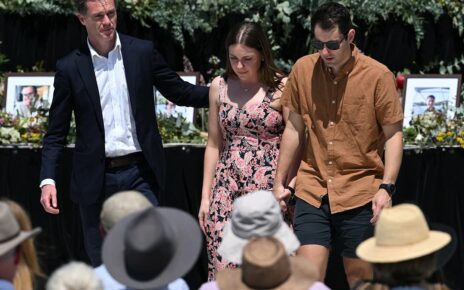WHEN Maureen Sullivan, aged 12, confided in a nun that she’d been sexually abused by her step-father for over three years, she was expecting help.
But the people who were supposed to care for her didn't, and she was thrown into a Magdalene laundry, working every day from 6am to 9pm for almost five years, with “no education, no playtime, and no speaking at all”.
“It was very cruel – and evil – how I was treated,” Maureen, now 71, from Carlow, Ireland, tells The Sun. “That should not have happened to me.”
Magdalene laundries are thought to have blighted the lives of tens of thousands of women across Ireland from the 18th century, all the way up to as recently as 1996, with “fallen women” entering via the criminal justice system, reformatory schools and the Health and Social Services sector.
Once inside, they would have to carry out unpaid labour, while many former inmates have reported being abused.
The laundries, also known as Magdalene asylums, became the subject of a media scandal in the 1990s, when a mass grave holding 155 bodies was discovered on the former grounds of one such institution in Drumcondra, Dublin.
READ MORE ON NEWS
I was raped 22 times by a grooming gang – I’ll never get my childhood back
Met Police on red alert after details of officers hacked in huge security breach
Luther star Ruth Wilson will be starring in a gripping new BBC drama inspired by the horrifying laundries, The Woman in the Wall, from Sunday night.
The thriller, which also stars Daryl McCormack, follows Lorna Brady (Wilson), a woman who was incarcerated in a convent from a young age, where she traumatically gave birth – only to have the baby taken away from her to whereabouts unknown.
The awful treatment she endured continues to impact her life, causing extreme bouts of sleepwalking that end with her waking up in strange and scary places with no memory of how she got there.
'I wasn't acting like a normal kid'
While Lorna's specific story is a work of fiction, Maureen is one of many women for whom it’s very real.
Most read in The Sun
I was raped 22 times by a grooming gang – I'll never get my childhood back
Danny Ings lined up for shock Premier League transfer switch from West Ham
Strictly star left furious after BBC boss branded her 't*ts & teeth' of show
I steal luxury goods for rich clients – I earn £500 a day, says shameless gran
One of the youngest people to have been held in a Magdalene laundry in Ireland, she was just 12 when she arrived at the Good Shepherd-run establishment at New Ross, Co Wexford, in 1964.
“I’d been abused by my stepfather since I was about eight or nine and I suffered for a few years,” Maureen explains. “Then, I was 12, and a nun at school noticed that I was very pale, and I wasn’t communicating with the other girls and refusing to play.
“I wasn't acting like a normal child should do.”
Having come from a very poor background, in which she’d share a bed with three of her siblings, Maureen recalls how a local nun 'bribed' her with chocolate to open up about the abuse.
“Chocolates were not something you would see in my house,” she says. “And they were like black magic to me.
“She offered me some and I explained to her the terrible things that were happening to me in the home.”
According to the law at that time, the nun had to inform the priest of what Maureen had said – and, soon after, a laundry van arrived to pick her up from her home.
“There was not one word said to my stepfather. He was never even questioned about it,” she says.
Whipped & stabbed with crucifix
Having been bought her first ever pencil case by her mum the night before, Maureen had been so excited to go to school.
But that laundry van never took her there.
Instead, she was taken straight to New Ross and made to work in the Magdalene laundry – effectively a workhouse run as a commercial laundry.
There, she would be washing clothes during the day and, “for recreation,” the women were forced to make rosary beads and knit yarn sweaters.
When there were big orders in, they’d often be working up to 9pm at night, having been up since 6am. Often, they were whipped or stabbed in the back with crucifixes to force them to work harder.
“No playtime. No education,” she says. “No care about how you feel, or why you’re so sad.
“They just didn't care.
“I was a young child, I should have been in school, I should've been out playing with other children. I should've been communicating with other children, but I was just a worker.
“They just worked me from morning to night.
“Nobody showed me one bit of love. Nobody spoke to me.
“They were cruel, horrible and evil people to treat a child like that, especially one that had been abused in the home.”
'I couldn't talk'
Over the following four years, Maureen was transferred to another laundry in Athy, Co Kildare, and was made to remain silent, apart from the odd supervised visit from her mother – who had no idea what was going on.
“I couldn’t talk, or tell my mother the truth about what was happening,” she explains.
Later, Maureen was moved to a home for the blind on Merrion Road in Dublin, where her work was much nicer – although still unpaid.
She says: “I was looking after the blind people and changing their beds, cleaning their dormitory, and things like that.
“They were lovely people, kind people and the nuns just didn't see us.
“And we could talk to the other girls, and I had a room on my own, like a little dormitory room on my own.”
It was eventually an unsupervised visit from her mum that allowed Maureen to leave the laundries, when she realised that her daughter hadn’t been getting paid for any of her work, and couldn’t even afford to buy shoes that fit.
After persuasion from her mum, Maureen told one of the nuns: “My mum said I should be earning money. I should be getting paid. My shoes are killing me.”
“My bag was packed that evening and I was left at Euston Station the next morning to go back to Carlow,” she recalls.
“Where was I to go in Carlow? They never even asked. They couldn't have cared less.
“I was left on the streets. I was homeless from that day. I couldn't go back to my home again.”
Maureen was so terrified of seeing her step-dad that she sent a neighbour to her mother’s house to tell her she was at the end of the road.
“My mother went, ‘He won't let you into the house. You may go and stay at your Granny's.’
“My poor granny didn't have a bed, so I had to sleep on the floor.”
Years of trauma
Ironically, Maureen took a job in the White Star laundry in Carlow before eventually “getting a little bit of money together” to head for London with her brother Paddy.
She worked at everything and anything, including on a building site, where she “chucked on a cap” and pretended to be a man, until the Irish Centre in Camden helped her.
“I got a room and a couple of rotten jobs and survived,” she says. “It was tough as I’d no skills. I didn't know how to cook. I didn't know how to look after myself, to take care of myself.”
She then met her first husband, whom she had a daughter, now 50, with, and later remarried someone with whom she had her 35-year-old son.
However, neither relationship worked out due to the trauma she’d endured in earlier life.
“My children had two fantastic fathers, they were great men,” she says. “It was just me. I just couldn't handle a relationship.
“I tried, but it has affected me so much. I could never have that beautiful thing that people have out there between a man and a woman and have a happy relationship.
“That was destroyed and taken from me.”
In 1988, things came to a head for Maureen and she tried to kill herself.
“I couldn’t get a decent job because I didn’t have the education and it just all hit me one day,” she says. “I was taken into hospital. I was got in time and was pumped out, and the rules there was if you try anything like that you have to go for counselling. I didn’t know what counselling was.”
At the age of 37, it was the first time Maureen had ever spoken about what happened to her in the Magdalene laundries.
“ I had to keep all that bottled up inside me. I felt ashamed because it was like it was my sin. That’s the way I was made to feel.”
Given a voice
Since the counselling, Maureen, now retired and living back in Carlow, has felt more and more empowered to tell her story, despite many Magdalene laundry survivors still feeling scared.
She has published a book about her ordeal, Girl in the Tunnel, and was also involved in marking the graves of women who had been in the laundries.
And she’s over the moon that Woman in the Wall is airing on BBC, educating more people about what happened in Ireland for so long.
The TV show follows depictions including 2002 movie The Magdalene Sisters, and 2013 film Philomena, which saw Dame Judi Dench nominated for an Oscar for her portrayal of Magdalene laundry survivor Philomena Lee and her 50-year search for her son.
Maureen says: “I met Philomena. She’s a lovely lady, powerful and so genuine.
“The cruelty that poor woman suffered, I go to her son’s grave sometimes, and it's just so cruel. It's heartbreaking.
“Can you imagine what the women went through before my time? I'd say it was 10 times worse, so I think it's lovely that they’re getting a voice.
However, for Maureen – and all the other Magdalene laundry survivors – her trauma will always be there, and affects her to this day.
Read More on The Sun
Vet’s urgent warning over soft toys – they could be deadly to your pet
The Love Island stars who can’t stop getting back together
“It’s still difficult to be around lots of people now,” she says. “I prefer being alone.”
The Woman in the Wall starts on Sunday on BBC One, followed by episode two on Monday. It then continues weekly on Mondays
Source: Read Full Article
















